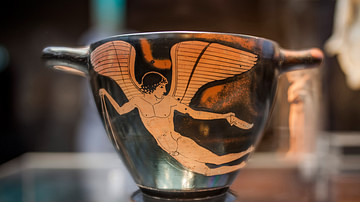Search
Did you mean: Hermes?
Search Results

Definition
Hades
Hades was both the name of the ancient Greek god of the underworld (Roman name: Pluto) and the name of the shadowy place below the earth which was considered the final destination for the souls of the dead. Perhaps the most feared of the...

Definition
Christianity
Christianity is the world's largest religion, with 2.8 billion adherents. It is categorized as one of the three Abrahamic or monotheistic religions of the Western tradition along with Judaism and Islam. 'Christian' is derived from the Greek...

Definition
Etruscan Civilization
The Etruscan civilization flourished in central Italy between the 8th and 3rd century BCE. The culture was renowned in antiquity for its rich mineral resources and as a major Mediterranean trading power. Much of its culture and even history...

Definition
Ancient Greek Music
Music (or mousike) was an integral part of life in the ancient Greek world, and the term covered not only music but also dance, lyrics, and the performance of poetry. A wide range of instruments was used to perform music which was played...

Definition
Jörmungandr
Jörmungandr is the Midgard Serpent (also World Serpent) in Norse mythology who encircles the realm of Midgard. He is the son of the god Loki and the giantess Angrboða and brother of the great wolf Fenrir and Hel, Queen of the Dead. At Ragnarök...

Definition
Greek Alphabet
The Greek Alphabet developed from the Phoenician script at some point around the 8th century BCE. The earlier Mycenaean Linear B script, used primarily for lists and inventories, had been lost during the Greek Dark Age, and the technology...

Definition
Agora
The term agora (pronounced ah-go-RAH) is Greek for 'open place of assembly' and, early in the history of Greece, designated the area in a city where free-born citizens could gather to hear civic announcements, muster for military campaigns...

Definition
Battle of the Alamo - The Fall of Heroes
Of all the battles of the Texas Revolution, the Battle of the Alamo (6 March 1836) is the most famous. It is not only among the best-known and most widely studied in American history but also around the world. The battle was the culmination...

Definition
Eros
Eros was the Greek god of love, or more precisely, passionate and physical desire. Without warning Eros selects his targets and forcefully strikes at their hearts, bringing confusion and irrepressible feelings. In the words of Hesiod, he...

Definition
Hercules
Hercules (Herakles) was a hero of Greek mythology famous for his great strength and endurance. Celebrated as an extraordinary mortal, his success in seemingly impossible labours won him an immortal place amongst the gods. As the greatest...